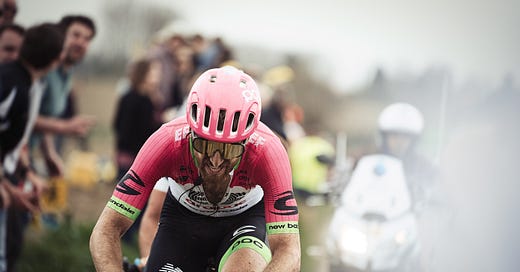The other day, I was thinking about writing an alternate history of cycling if Tadej Pogačar didn’t exist. I got as far as “Tejay van Garderen would’ve won the 2019 Tour of California” and immediately realized that such a thought exercise was far more complicated than I wanted to contemplate at the moment.
So instead, I’ll take a quick stab at two other historical watershed moments that allowed a glimpse at alternate universes that I would’ve liked to have seen. Nothing too morbid—there is a crash involved here, and bad ones, but I’m not going to go on about what would’ve happened if Bjorg Lambrecht hadn’t died or anything like that.
What if Pedro Delgado Had Shown Up on Time?
I’m sure I’ve written about this before, but it’s my favorite cycling farce…probably ever. Maybe my favorite farce in sports history.
The 1989 Tour de France started with a prologue time trial in Luxembourg. The heavy pre-race favorite was not eventual winner Greg LeMond—just back on the road properly after a near-fatal hunting accident in 1987—or Laurent Fignon, who’d won the Giro and held the yellow jersey into the final stage. It was Pedro Delgado, who’d won the race in 1988 and followed up with GC victory at the Vuelta the following spring.1 As defending champion, Delgado wore jersey no. 1 and started the first stage last. Only when his start time came up, he wasn’t there.
Delgado had been warming up by his team bus, then wandered off for a little peace and quiet with about 20 minutes to go…and then he didn’t show up at the starting gate when his time came. So they started the clock without him.
It wasn’t until the clock hit two minutes, 40 seconds that Delgado finally showed up, scrambled into the starthouse, and rolled off.
He only spent eight seconds longer on the course than Fignon and LeMond, but he ended the day in last place. Then, as you might expect, he had a bit of a freakout. Delgado didn’t sleep all night, and there were two stages—a mass start stage and a team time trial—on Day 2 of the race. Delgado zonked on both stages, and if his Reynolds team hadn’t held up and waited for him during the TTT, he would’ve finished outside the time cut.
As it was, Delgado lost nine minutes and 57 seconds to the yellow jersey on the first two days of the race, and seven minutes and 20 seconds to Fignon.
Except, after that, he got his shit together and wrecked house. Delgado was back in the top 10, within three minutes of Fignon and LeMond, by Stage 10. After Stage 20, when LeMond was famously 50 seconds down on Fignon heading into the final time trial, Delgado was only 2:28 behind the Frenchman. Which means that if Delgado had shown up at the starting gate when required and completed the course in the exact same time—Day 2 disaster and all—he would’ve been in yellow heading into the final stage.
Let’s say Delgado wins the Tour in 1989. At that point, he’d have won three grand tours out of four. As it was, Delgado was just fine for the rest of his career; he podiumed the Vuelta three more times and finished in the top 10 in the Tour every time he raced it thereafter. But he never won another grand tour, nor did he win one of the big, important one-week stage races like Paris-Nice. And in 1989, one of Delgado’s young domestiques took his first career Tour de France stage win: Miguel Induráin, who was, at the time, a week shy of his 25th birthday.
Delgado and Induráin remained teammates through the end of Delgado’s career in 1994, but by 1991 Induráin had supplanted Delgado as Reynolds’ Tour de France GC leader, and you know the rest.
Would Delgado, buoyed by another maillot jaune in 1989, have remained atop the totem pole long enough to derail the start of Induráin’s early-1990s dominance?
By the same token, LeMond was thrilled to even be competitive in 1989. Surely second or third place wouldn’t have been a disappointment. But would it have spurred him to win a second world championship in 1989, and to win the Tour again in 1990? Certainly it would’ve robbed us of LeMond’s comeback in the time trial, which is the only moment in cycling history the average American sports fan would have a prayer of naming.2
As for Fignon, what if he had finished second behind Delgado in routine fashion, rather than wearing the ignoble end of the sport’s most famous comeback? In his career, Fignon won three grand tour GC titles, two monuments and 15 grand tour stages. Of those victories, only one Tour de France stage win came after 1989, and he never stood on the podium of a grand tour again. I know he looked old in photos—everyone did in the 1980s, and the skullet didn’t help—but Fignon was only 28 at the end of the 1989 Tour. Would his career have ended differently?
We’ll never know, all because Delgado got lost between his bus and the starthouse.





